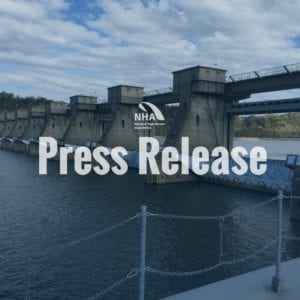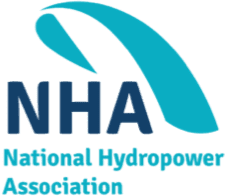
Congress Passes AWIA with Key Hydropower Provisions; Bill Heads to President’s Desk
Supports Non-Powered Dam and Closed-Loop Pumped Storage Project Deployment
Washington, D.C. (October 10, 2018) – The National Hydropower Association (NHA) applauded the U.S. Senate’s passage of the America’s Water Infrastructure Act of 2018 (AWIA), which included several provisions promoting hydropower deployment. The bill will facilitate a more efficient licensing process for proposed projects at existing non-powered dams and for closed-loop pumped storage; shorten the approval timeline for projects utilizing existing conduits; provide regulatory incentives for investments at existing hydropower facilities; and modernize preliminary permit terms and deadlines for starting construction of newly licensed projects.
“Today the U.S. Senate reaffirmed its commitment to clean, renewable hydropower, as these provisions will assist our industry growth, support investments in the existing system, and strengthen the resiliency of our nation’s grid,” said Linda Church Ciocci, NHA President and CEO. “Just two years ago, the U.S. Department of Energy released a landmark report demonstrating that U.S. hydropower has immense growth potential. However, that growth has been stifled by outdated licensing and regulatory policies. While significant work remains to further modernize the hydropower licensing process, the measures included in AWIA are meaningful steps forward. With these legislative improvements, we now have an opportunity to more efficiently develop new projects that add generation to non-powered dams, closed-loop pumped storage, and conduit power projects.”
Hydropower Provisions Contained in the Bill:
- Non-Powered Dams: The bill requires FERC to establish an expedited process for issuing licenses for hydropower facilities at existing, non-powered dams. FERC will convene an interagency task force with appropriate federal and state agencies and Indian tribes to craft this process. FERC must also coordinate with the Departments of the Army, Interior and Agriculture to jointly develop a list of existing nonpowered federal dams that have the greatest potential for non-federal hydropower development.
- Closed-Loop Pumped Storage: The bill requires FERC to establish an expedited process for issuing licenses for closed-loop pumped storage projects. FERC will convene an interagency task force with appropriate federal and state agencies and Indian tribes to craft this process. FERC must also hold a workshop to explore potential opportunities for development of closed-loop pumped storage projects at abandoned mine sites.
- Conduit Hydropower: The bill enables conduit projects up to 40 MW to qualify for the expedited licensing process approved by Congress in 2013. Previously, projects were capped at 5 MW. The bill also reduces the timeframe of the expedited timeframe by 2 weeks.
- Early Action Credit: The provision directs FERC to consider, in determining the term of a new license, project-related investments made over the term of the existing license. It requires FERC to give the same weight to these investments, which include re-development activities, new construction, new capacity, efficiency improvements, modernization efforts, rehabilitations, safety improvements, and recreation and environmental measures.
- Start Construction Deadline Extensions: The bill provides FERC the authority to extend the deadline for a newly licensed project to begin construction. Prior to today’s enactment of AWIA, construction was required within 2 years of licensing, and FERC was authorized only to grant a single 2-year extension. Due to the number of post-licensing construction approvals, refinements in final project design, continuing negotiations on power purchase agreements, and securing financing, most projects need more time. Previously, a licensee would need to seek approval by Congress through individual project legislation to extend the construction deadline.
“NHA commends the leadership of Senate Energy and Natural Resource Committee chairman Murkowski and ranking member Cantwell, as well as that of Environment and Public Works Committee Chairman Barrasso and ranking member Carper, for supporting these provisions as part of the package,” added Church Ciocci. “We look forward to continued work with these leaders on important licensing improvements for the majority of projects that are still needed. These are currently pending before the Senate and are awaiting final action.”
###


